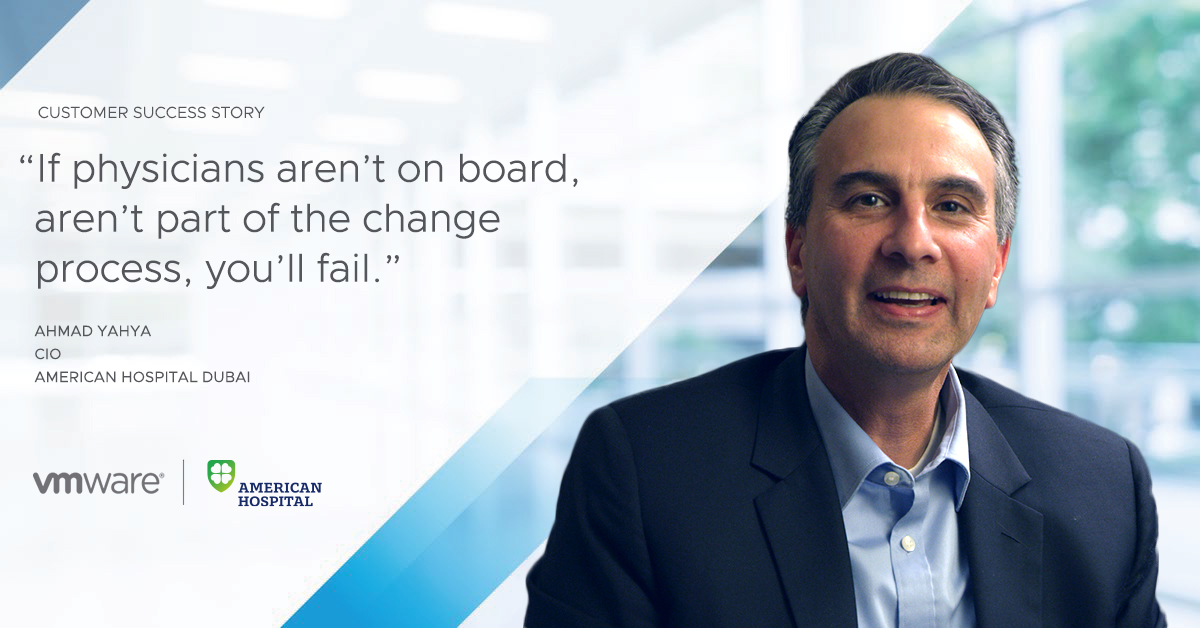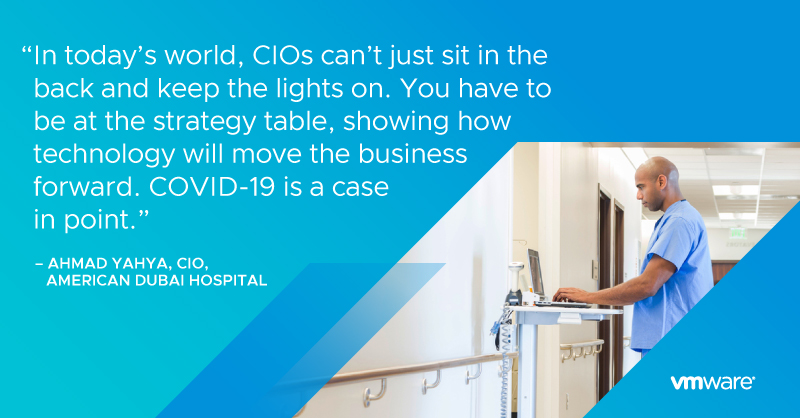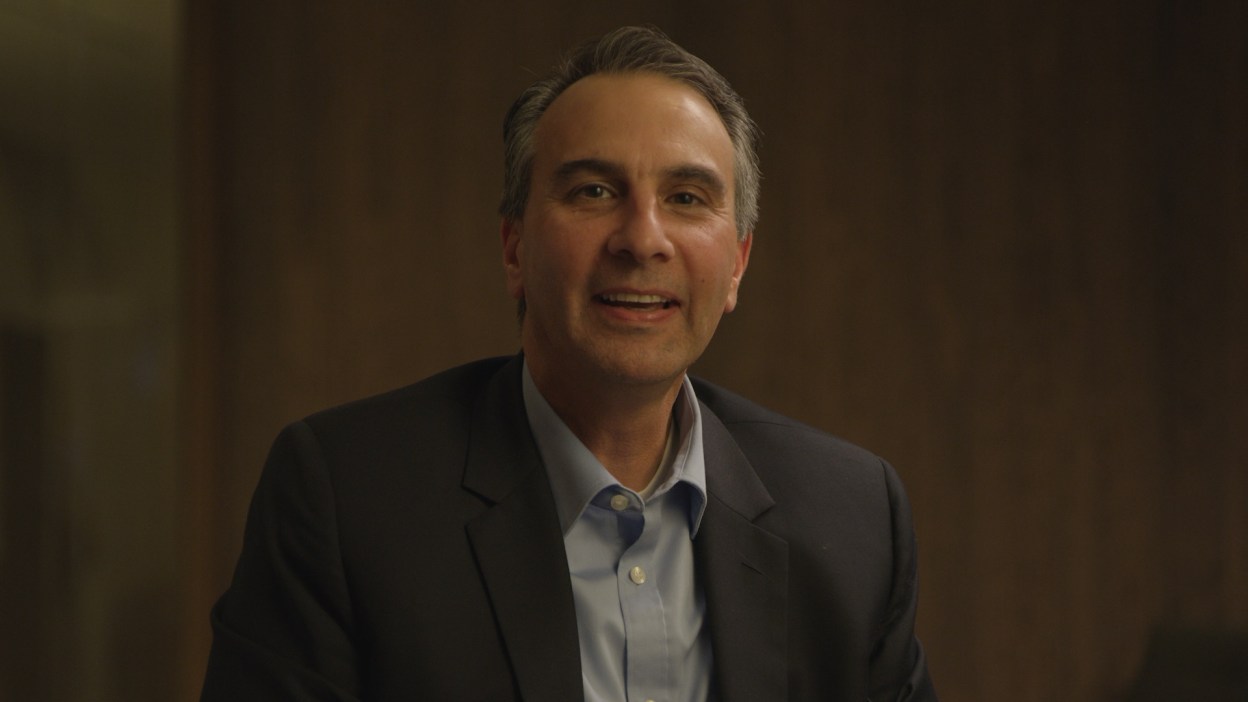Ahmad Yahya is driven. And that characteristic served him particularly well over the last few, very busy weeks. As CIO of American Hospital Dubai, he’s been leading the hospital’s IT response to the COVID-19 outbreak.
[caption id="attachment_21547" align="aligncenter" width="1200"] VMware’s Agents of Change initiative celebrates technology leaders who challenge the status quo. By harnessing the power of digital transformation, they create unlimited possibilities for their businesses. Here’s the next technology leader in the Agents of Change series: Ahmad Yahya, CIO of the American Hospital Dubai.[/caption]
VMware’s Agents of Change initiative celebrates technology leaders who challenge the status quo. By harnessing the power of digital transformation, they create unlimited possibilities for their businesses. Here’s the next technology leader in the Agents of Change series: Ahmad Yahya, CIO of the American Hospital Dubai.[/caption]
Rapidly Switching IT Priorities
Yahya had to rapidly switch the focus of his team to three key priorities:
- Transform a hotel into an operational, 390-bed field hospital for COVID-19 patients, including secure access to the main hospital IT services.
- Strengthen remote-working capabilities for the hospital’s administrative employees, which included call center, finance and HR functions among other areas.
- Launch a new telehealth service—months earlier than planned—to ensure patients can still access medical experts and treatments. This was vital to patients and hospital operations.
“Agility has been key,” Yahya reflects. “You can’t always think in a structured manner. You’ve got to take risks to achieve the goal, even though it may not be perfect. You must really support the business. At times like this, you can’t say ‘no.’ You’ve got to figure something out. Even if it’s just 50 percent of what’s been requested, it’s better than saying no. That’s worked out well for us.”
Of course, as part of the hospital’s management team, Yahya has another priority: looking after the welfare of his IT staff.
“They are scared and are concerned coming to work,” he says. “You have to handle and understand their concerns about themselves and their family. You have to have empathy and assure them that the hospital’s management is putting their safety at the forefront.”
IT as a Strategic Partner to the Business
The speed with which American Hospital Dubai responded to COVID-19 demonstrates the value IT brings to the organization.

“These disruptive changes that COVID-19 has inflicted on society, which include customer behaviors and emergency responses, dramatically shifted our workload and focus,” he continues. “Our operational focus and transformational efforts had to be paused and re-purposed to think in an agile way to meet country, business and client needs. We had to redeploy our staff and shift focus to help us cope with the crisis. And this strengthened our sense of contribution and purpose.”
“In my opinion, in light of the current worldwide circumstances and looking ahead, we have to enhance all online channels to our organizations and support new interactions and business models for our services and customers,” he concludes.
American Hospital Dubai is known for its quality of care, forward-thinking and clinical outcomes. Their digital transformation journey includes investing in a new evidence-based clinical system that will enhance outcomes and patient safety. Yahya applied his strategic way of thinking by asking: Why not take this opportunity to build a new business model based on our strengths?
“The idea is to sell our services through a private clinical cloud to a network of affiliated clinics, extending American Hospital processes and best practices. This will ultimately generate revenue, which appeals to the board and builds their trust in IT as a partner in growth. The idea also aligns with the Dubai Health Authority push for ‘one patient, one record.’ And with this business concept, I’m building a case for higher-end tech investment,” he says.
Whether or not the organization adopts this idea, it’s certainly cemented the role of IT in strategy discussions.
Engage Clinicians or Fail
Whatever the business model, real-time access to healthcare processes, patient-centric data and visibility and transparency of operations are crucial for patient outcomes. For this to work, clinicians need to trust the processes and data to provide effective proactive and preventive care.
“If physicians aren’t on board, aren’t part of the vendor selection and change process, you’ll fail,” Yahya says.
In Yahya’s experience, trust comes when IT spends time engaging clinicians. This starts with the vendor selection process, which includes:
- Attending demos of scripted clinical workflows.
- Understanding the implementation process and value of data.
- How it flows to support clinical outcomes for them.
An example of a very successful decision-making function available in leading clinical systems is sepsis alerts. The solution offers real-time surveillance and electronic alert notification capabilities for ICU patients, resulting in saving lives.
The function uses data and algorithms that correlate different indicators to alert and detect, resulting in a huge impact on mortality rates. When clinicians see the impact, they start to believe in the systems. They start participating and contributing ideas. And that’s when Yahya believes positive, sustainable change happens.
Bringing Patients into the Process
Involving patients in the change process is just as important to Yahya.
“Patient engagement and active participation in workflow designs during implementation will lead to a patient-centered system that will have positive outcomes and should be a critical objective for organizations like ours. It is important to ensure the best patient experience, outcomes and address data privacy concerns,” he says. “Physician‐patient interaction and communications also optimizes the patient experience.”
Yahya sees patient engagement as fundamental to the sustainability of healthcare, and technology is core to achieving it.
“It’s not about one interaction, one episode. It’s the whole journey,” he says. “With leaders, patients and clinicians in the decision-making process, you get a holistic perspective. You engage, you listen, you deliver. That builds trust. And when you have trust, the change you make can last.”

